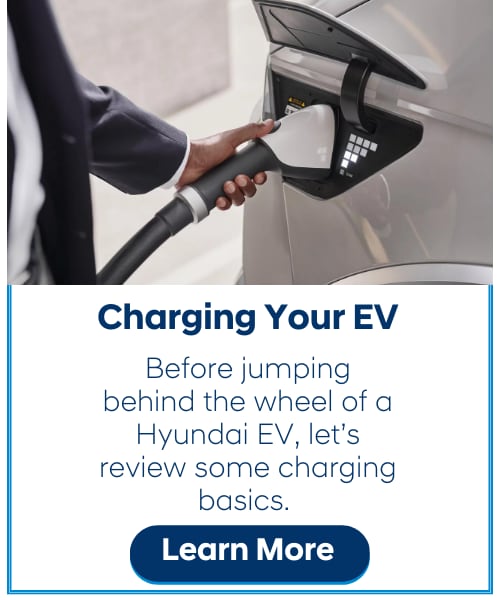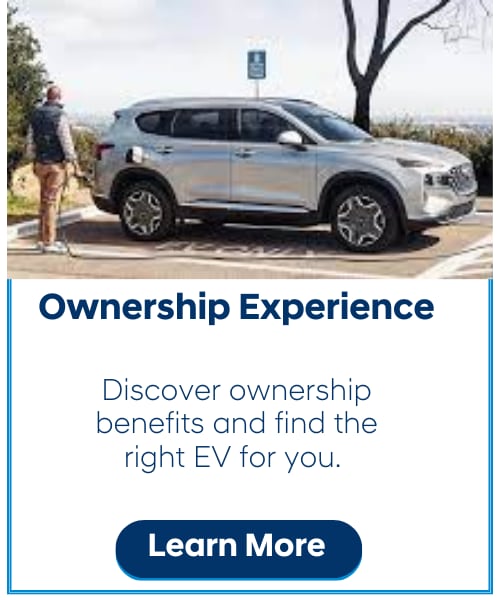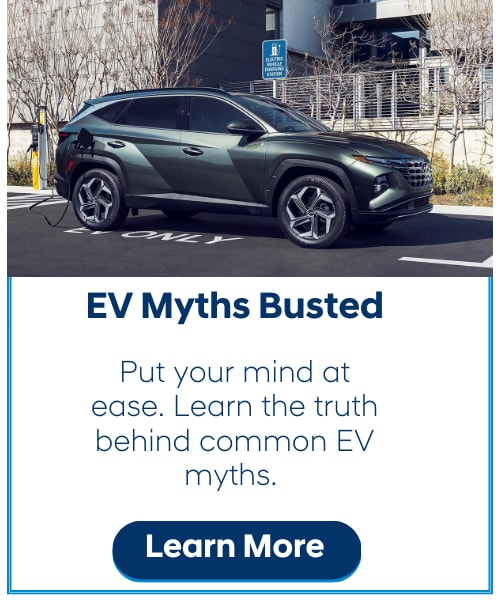
Hyundai EV Education Hub
Ride with Rosen Hyundai into a fully-electric future.
The electric automotive industry is booming, and Rosen Hyundai leads the way! Explore our excellent range of fully electric and hybrid Hyundai models in Algonquin, IL.
Questions about the electric lifestyle? Our team of excellent staff members is here to answer any questions you have!
What you need to know about Hyundai EVs
Search our Inventory of Full-Electric and Plug-In Hybrids
Shop New
Thinking of every mile? Start mapping out your trip.
Find Charging Stations Near You
EV Range Map
EV Incentives and Special Offers
In search of Hyundai EV deals in your local area? Discover a range of special offers, including tax incentives and electric Hyundai promotions, at Rosen Hyundai of Algonquin.
How Does Hyundai Compare to the Competition?
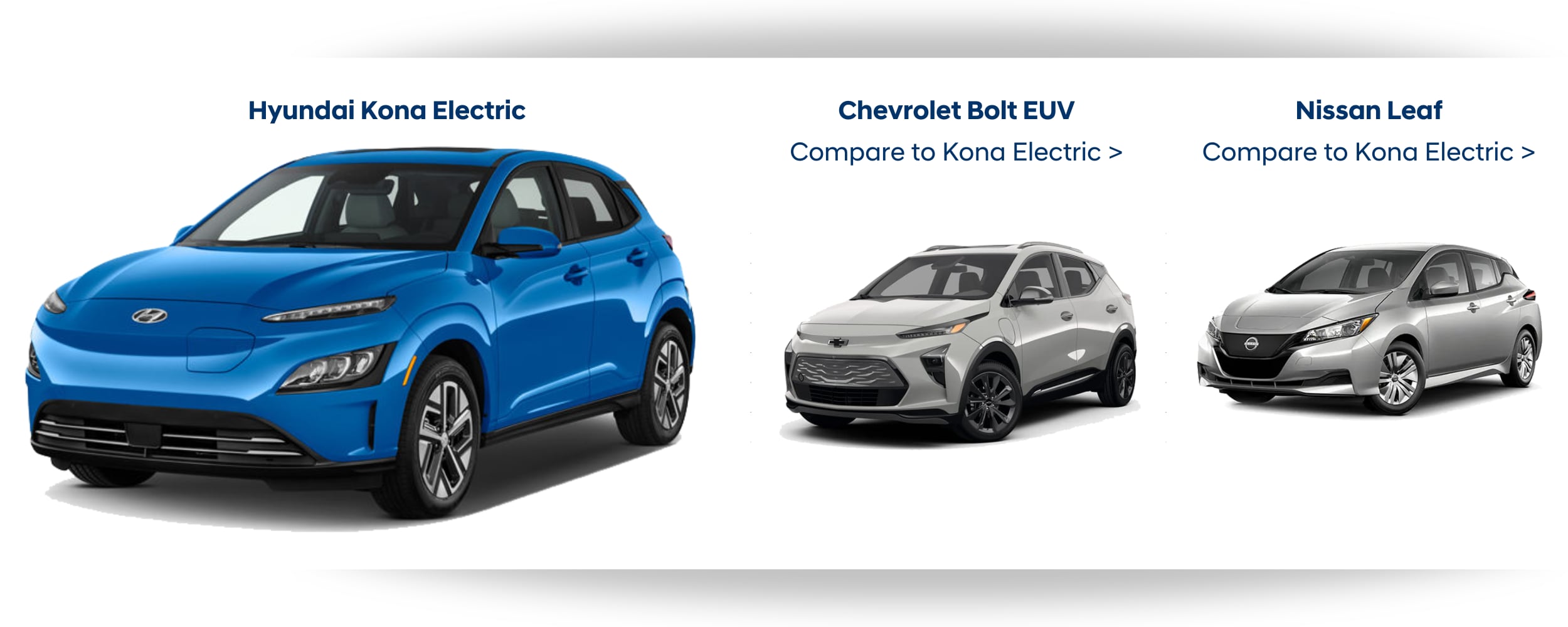
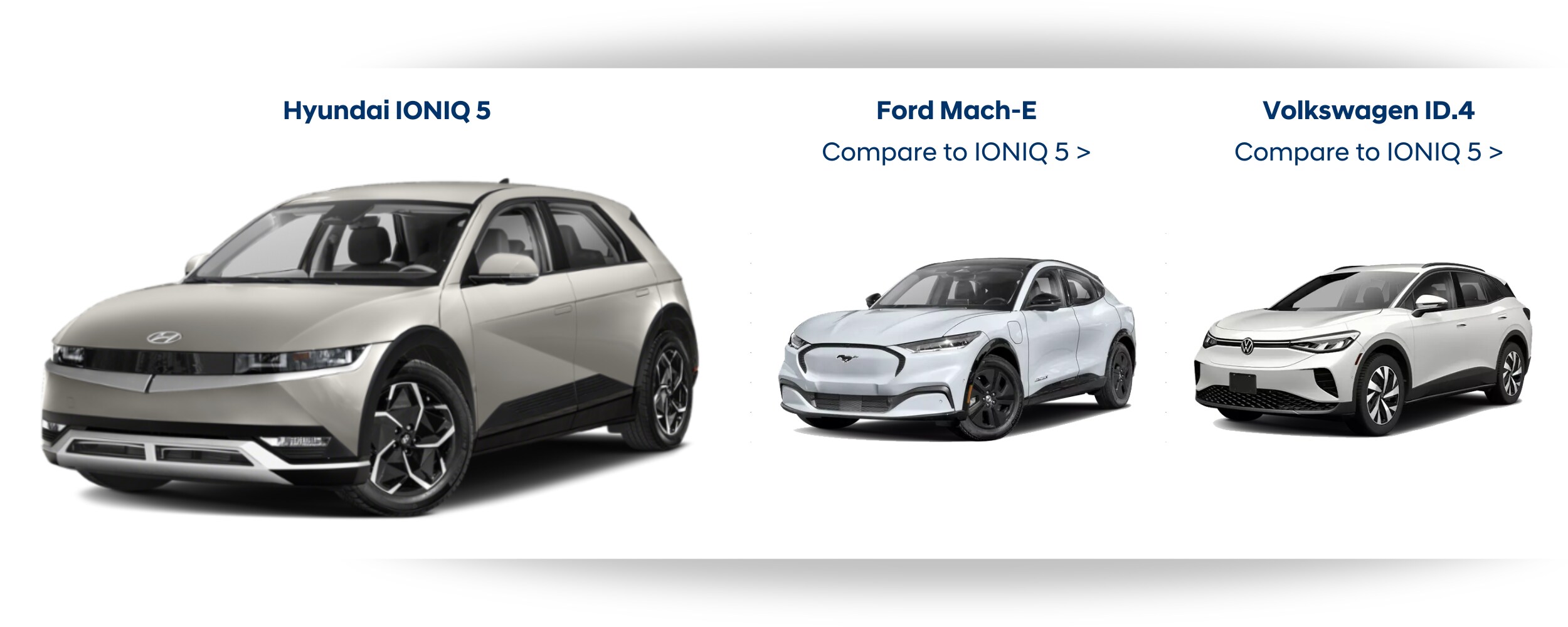
Common EV Questions
- Hyundai offers a range of EV models, including the Kona Electric and the Ioniq Electric, each with different battery sizes and charging capabilities. Hyundai provides estimated charging times for each of their electric vehicles, and you can consult the owner's manual or the manufacturer's website for more information on charging times and recommendations. Here's a general overview of the charging times for Hyundai electric vehicles:
- Level 1 Charging: This is the slowest and least common charging method, and it involves using a standard 120-volt household outlet. Level 1 charging can take up to 20 hours or more to fully charge a Hyundai electric vehicle.
- Level 2 Charging: This is the most common charging method for home charging stations and public charging stations. Level 2 charging typically uses a 240-volt charging station and can charge a Hyundai electric vehicle in around 6-8 hours, depending on the battery size.
- DC Fast Charging: This is the fastest charging method and is only available at certain public charging stations. DC Fast Charging can charge a Hyundai electric vehicle from 0 to 80% in around 30-60 minutes, depending on the model and the size of the battery pack.
- You can charge your electric vehicle at home using a home charger, which can be installed in your garage or driveway. This type of charger is typically slower than public charging stations but is more convenient for overnight charging.
- Level 2 chargers use a 240-volt AC power source, which is typically the same voltage as an electric clothes dryer or stove, and can charge an EV up to 3-5 times faster than a Level 1 charger.
- Compared to a Level 1 charger, which uses a standard 120-volt household outlet, a Level 2 charger provides much faster charging experience.
- One potential drawback of Level 2 charging is that it may require additional installation costs, particularly if a homeowner needs to upgrade their electrical service to accommodate the higher voltage requirements of the Level 2 charger.
- Overall, a Level 2 charger can be a good investment for Hyundai owners, particularly for those who drive longer distances on a regular basis.
- The range of a Hyundai EV is typically shorter than that of a gasoline-powered car (ICE) vehicle, but it's important to note that the driving range of an EV can vary depending on several factors, including the model of the vehicle, driving style, weather conditions, and terrain.
- For example, the 2023 Hyundai Kona Electric has an estimated driving range of up to 258 miles on a single charge, which is comparable to other EVs on the market today. This is less than the range of many ICE vehicles, which can typically travel 300-400 miles on a full tank of gas.
- However, it's worth noting that most people don't need to travel more than 258 miles in a single day, and the average daily commute in the U.S. is less than 30 miles round trip. For the majority of drivers, the range of an electric vehicle is more than sufficient for their daily needs with a recharge at night.
- Additionally, charging infrastructure is rapidly expanding, and it's becoming increasingly easy to find public charging stations on longer trips.
- Hyundai offers home charging equipment for its electric vehicles through a partnership with Electrum. The charging equipment is available for purchase through Hyundai Home Marketplace.
- To ensure that the charging equipment is installed safely and meets all local electrical codes and regulations, Hyundai recommends having the charging equipment installed by a licensed electrician.
- The availability of Hyundai home EV charging equipment may vary by region, so it's best to check with Hyundai Home Marketplace or your local Hyundai dealership for more information. For another option, there are many third-party home charging equipment providers available, and Hyundai EVs are compatible with a wide range of charging equipment.
- Yes, you can charge your Hyundai electric vehicle at a public charging station, as long as the station is compatible with your vehicle's charging port. Most public charging stations support multiple charging standards, including CHAdeMO, CCS, and Type 2 (also known as Mennekes), which cover a wide range of electric vehicles, including Hyundai electric vehicles. Public charging stations can be found in parking garages, shopping centers and other public places. Some public charging stations require a membership or payment, while others are free to use.
- It's important to note that the charging time can vary depending on the level of charging station and the battery size of your vehicle, so plan accordingly. Also, be aware that some charging stations may have limited availability or be in use by other electric vehicle owners, so you may need to be patient or plan your charging times in advance.
- Yes, it is possible to charge your electric vehicle using solar power.
- Once you have a solar panel array and inverter installed, you can use a Level 2 charging station that is compatible with your Hyundai electric vehicle to charge your vehicle using solar power. The charging station will need to be connected to the solar inverter, and you'll need to make sure that the charging station is capable of handling the maximum power output of your solar panel array.
- Overall, charging your Hyundai electric vehicle using solar power is a sustainable and environmentally friendly option, but it requires some additional investment and planning. You may also need to use a combination of solar power and grid power to ensure that your vehicle is charged when you need it.
- The cost of electricity for charging a Hyundai EV depends on the location and the cost of electricity in that area. On average, it costs around $0.13 to $0.15 per kilowatt-hour to charge an electric vehicle. This means that it costs around $5 to $10 to fully charge an electric vehicle, depending on the size of the battery and the cost of electricity in your area.
If you want to get behind the wheel of a brand-new electric vehicle, there's no better prize than the keys to a stylish new Hyundai EV. At our Hyundai dealership in Algonquin, we are proud to have one of the largest selections of electric vehicles in the area. Whether you're looking at a spacious Hyundai Tucson Hybrid or and sleek and stylish Elantra HEV sedan to improve your drive, our experienced team will get you in a vehicle that matches your needs and lifestyle. Visit our Chicago EV dealer today to find an electric Hyundai for sale near you!
